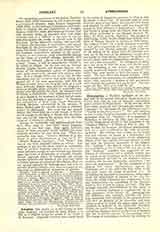

Athenagoras, a Christian apologist of the second half of the second century of whom no more is known than that he was an Athenian philosopher and a convert to Christianity. Of his writings there have been preserved but two genuine pieces: his “Apology” or “Embassy for the Christians” and a “Treatise on the Resurrection“. The only allusions to him in early Christian literature are the accredited quotations from his “Apology” in a fragment of Methodius of Olympus (d. 312) and the untrustworthy biographical details in the fragments of the “Christian History” of Philip of Side (c. 425). It may be that his treatises, circulating anonymously, were for a time considered as the work of another apologist. His writings bear witness to his erudition and culture, his power as a philosopher and rhetorician, his keen appreciation of the intellectual temper of his age, and his tact and delicacy in dealing with the powerful opponents of his religion. The “Apology”, the date of which is fixed by internal evidence as late in 176 or 177, was not, as the title “Embassy” (tresbeia) has suggested, an oral defense of Christianity, but a carefully written plea for justice to the Christians made by a philosopher, on philosophical grounds, to the Emperors Marcus Aurelius and his son Commodus, conquerors, “but above all, philosophers”. He first complains of the illogical and unjust discrimination against the Christians and of the calumnies they suffer (i-iii), and then meets the charge of atheism (iv). He establishes the principle of monotheism, citing pagan poets and philosophers in support of the very doctrines for which Christians are condemned (v-vi), and demonstrates the superiority of the Christian belief in God to that of pagans (vii-viii). This first strongly reasoned demonstration of the unity of God in Christian literature is supplemented by an able exposition of the Trinity (x). Assuming then the defensive, the apologist justifies the Christian abstention from worship of the national deities (xiii-xiv) on grounds of its absurdity and indecency, quoting at length the pagan poets and philosophers in support of his contention (xv-xxx), Finally, he meets the charges of immorality by exposing the Christian ideal of purity, even in thought, and the inviolable sanctity of the marriage bond. The charge of cannibalism is refuted by showing the high regard for human life which leads the Christian to detest the crime of abortion (xxxi-xxxvi). The treatise on the “Resurrection of the Body”, the first complete exposition of the doctrine in Christian literature, was written later than the “Apology”, to which it may be considered as an appendix. Athenagoras brings to the defense of the doctrine the best that contemporary philosophy could adduce. After meeting the objections common to his time (i), he demonstrates the possibility of a resurrection in view either of the power of the Creator (ii-iii), or of the nature of our bodies (iv-viii). To exercise such powers is neither unworthy of God nor unjust to other creatures (ix-xi). He shows that the nature and end of man demand a perpetuation of the life of body and soul.
JOHN B. PETERSON

